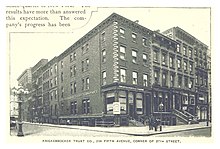Dorothy Harriet Camille Arnold
She was educated at the Veltin School for Girls in New York City and attended Bryn Mawr College where she majored in literature and language. She graduated in 1905.
In 1910, Dorothy was still living with her family on 108 East 79th Street. That spring, she submitted a short story to McClure's magazine and was rejected. Her family teased her mercilessly. This prompted Dorothy to rent a post office box to receive correspondence from magazines and publishing houses.
When Dorothy submitted a second short story, "The Poinsettia and the Flame", in November 1910, she was rejected again. Dorothy asked her father if she could take an apartment in Greenwich Village in order to write. Her father denied her request and told her that a good writer could write anywhere.
On December 12th, around 11 a.m., 24-year-old Dorothy told her semi invalid mother that she was going to go buy a dress for her younger sister’s debutante party. Mary offered to go with her daughter, but Dorothy said she wanted some time alone. When she left, Dorothy was wearing a tailor-made blue serge suit, a long blue coat, lapis lazuli earrings and a small black velvet hat lined in pale blue and decorated with two silk roses and a lapis lazuli pin. She had approximately $25–30 cash in her possession (approximately $672 to $807 today).

Dorothy left her home and walked to the Park & Tilford store at the corner of Fifth Avenue and 27th Street. The streets were slippery due to the bad weather, but Dorothy made it there unscathed. While at the store, she charged a half pound box of chocolates to her account. She placed the candy in her muff and went on to Brentino’s bookstore. There she purchased Engaged Girl Sketches, numerous and romantic stories by Emily Calvin Blake. Both shop assistants who served her in these two shops said she was courteous, and did not exhibit any unusual behavior.
That evening, when Dorothy failed to show up for dinner. It was extremely unlike Dorothy to stay out for so long without alerting her family. Her family was worried, but they hoped she was at a friends house. Just after midnight, Elsie Henry, one of Arnold's friends, called to see if Dorothy had returned. Mary told her that Dorothy had returned home. When Henry asked to speak to Arnold, Mary hesitated and told Henry that Dorothy had gone to bed with a headache.
When the next evening rolled around, they didn’t call the police then either, instead they called in John Keith, the family lawyer. He came over and searched Dorothy’s bedroom. Nothing seemed missing. Letters bearing foreign postmarks, and two folders for transatlantic steamers were found on her desk. There was also some burnt paper, which was assumed as a failed manuscript.
The family hired the Pinkerton Detective Agency to go to different cities and even overseas to question Dorothy's friends and try to find a clue to where she could have been. Meanwhile, John Keith spent many weeks searching New York’s prisons and hospitals, but to no avail. And after Keith and the Pinkerton detectives could not find any trace of Dorothy, they convinced the family into going public with her disappearance.
The police didn't take much credence to his theory, due to the fact the reservoir was frozen due to the cold weather. Regardless, the park was searched and in the spring the reservoir thawed and it was searched.
While Mr. Arnold was talking to the press, Mrs. Arnold was in Italy interrogating Griscom. Griscom was quick to deny any involvement in Dorothy’s disappearance. Mrs. Arnold asked for the letters that Dorothy had sent him. He said that he had burned them, and that they weren't important. But he did say that in the letters he had recently exchanged with her Dorothy talked about the failed short story she had submitted to a magazine. So also said, “All that I can see ahead is a long road with no turning…Mother will always think there was an accident.”
After returning home from Italy, the family learned from a number of friends that Griscom had refused to marry Dorothy. However when Griscom returned from his vacation, he told the press that he intended to marry Dorothy once she was found and on the condition that her mother approve of the marriage. Griscom Jr. spent thousands of dollars for ads in major newspapers asking her to come home.
Six years after Dorothy’s disappearance, a convict from Rhode Island detailed how someone paid him $150 to dig a grave for a body that fit her description. He gave a description of the man he worked for, which turned out it was strikingly similar to Griscom. The convict also specified that the woman had died after an abortion went wrong and that the person had kept the body in their cellar. Authorities searched cellars all over the East Coast, but couldn’t find a body.
In 1922, her father passed away, followed by her mother six years later. Francis wrote in his will that he would leave nothing from his estate for Dorothy, “for I am satisfied that she is not alive.” Her mother's view differed and she hoped that her daughter was still alive. After Mary passed away John Keith publicly stated he believed that Dorothy had committed suicide because of her failed writing career.

No comments:
Post a Comment